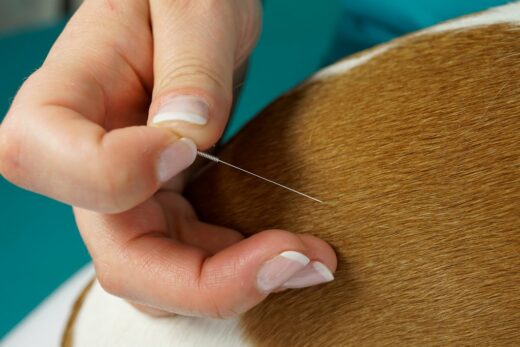
Ear infections can be a serious concern for dogs, but there might be times when you can’t get professional help and need to know how to treat dog ear infection without vet assistance.
Ear infections in dogs can be caused by a wide range of factors, including bacteria, viruses, mites, and underlying medical conditions. If your dog’s ears don’t clear up by themselves, then you’ll need to provide them with a remedy!
Luckily, there are many home treatments that work effectively to combat a dog’s ear infections. In this article, we’ll discuss those treatments, but we also stress that if you’re in any doubt as to the severity of your dog’s ear infections, please visit your vet.
Dog Ear Infection Symptoms
Infections can affect any dog’s ears, and there are a wide range of possible causes, including mites or bacteria. Some dogs are more susceptible than others, however; if you have a dog with large or floppy ears (such as a Golden Retriever or a Basset Hound), then your pet will be more likely to contract infections than breeds with smaller ears.
Regardless, all pet owners need to look out for the signs and symptoms of an ear infection in dogs. Your dog might make it obvious, but only if they are experiencing extensive or prolonged discomfort. A dog inner ear infection can often go unnoticed, purely because it’s hidden from sight (and because your dog can’t talk to you).
The first symptom of an ear infection you might notice is your dog itching or scratching at their ears. This isn’t helpful, so it’s important to treat them quickly before they cause damage to their ears or worsen the infection. If their ears are smelly or starting to become gunky, then you’ll also need to start clearing up the infection quickly.
We recommend checking your dog’s ears regularly to catch signs and symptoms of infection early on – before they start to cause more visible, painful symptoms. If you regularly clean your dog’s ears, you can avoid the onset of infections, too.
If you do notice the following symptoms of ear infections, then it’s time to get the home remedies out:
- Shaking their head
- Tilting their head to one side
- Scratching their ears
- Rubbing their ears against the ground or furniture
- Ears that are hot to the touch
- Pungent, smelly ears
- Gunky, waxy ears
- Discharge from the ears
- Red or obviously irritated ears
- Bleeding, scabs, or other signs of infection
- Visible pain or soreness
If you’re unsure if your dog has infected ears, then it’s wise to seek veterinary assistance before applying any dog home remedies for ear infection yourself.
Different Types of Dog Ear Infections
There are several different types of ear infections that dog owners need to be aware of if they are attempting to treat their pets at home.
There are 3 major infections to consider:
- Otitis externa – an external ear infection, which affects the outside of the ear. This is the most common ear infection and can be treated at home if caught early enough. It is characterized by redness, soreness, and pain on the outside of the ear.
- Otitis interna – an internal infection of the ear that can be more difficult to spot. If it continues, despite attempted treatment, you must seek veterinary advice.
- Otitis media – an infection of the middle section of the ear (not the outside or the inside!).
Infections may start on the outside or middle section of the ear and, if left untreated, can eventually spread into the inner ear. For this reason, it’s always important to tackle an ear infection as soon as it’s spotted.
Causes of Dog Ear Infections
There are several different causes and it’s important to try and identify what has caused your dog’s ear infection. This not only helps you to apply an effective treatment to beat the infection, but it can help you to make lifestyle changes that will avoid further ear infections later in life.
Major causes of an ear infection include the following:





